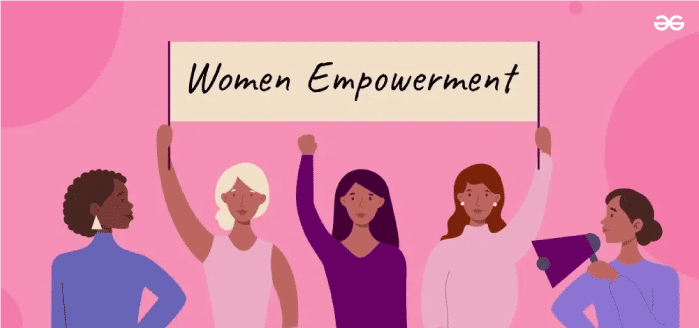Women Empowerment: Paving the Way for Equality and Progress
Introduction:
Women empowerment is a crucial aspect of achieving gender equality and fostering social progress. It entails providing women with equal rights, opportunities, and resources to participate fully in all spheres of life. In this essay, we will explore the definition, types, barriers, and the role of education in empowering women.
Definition of Women Empowerment:
Women empowerment means accepting and allowing women to make their own decisions, providing them with education, and empowering them to reach their full potential. It is a process that gives women power over their own lives, society, and communities. Empowered individuals can access opportunities without limitations, whether in education, professions, or lifestyle choices.

Types of Women Empowerment:
- Economic Women Empowerment:
- Economic empowerment increases women’s agency, access to formal government programs, mobility outside the house, financial independence, and buying power.
- Policymakers should support job training to help women enter legal markets, providing them with higher bargaining power.
- Strengthening women’s access to property inheritance and land rights is essential for economic empowerment.
- Social Women Empowerment:
- Social empowerment focuses on changing societal norms and attitudes.
- It involves promoting gender equality, challenging stereotypes, and advocating for women’s rights.
- Education and awareness campaigns play a crucial role in social empowerment.
- Political Women Empowerment:
- Political empowerment ensures women’s participation in decision-making processes.
- Encouraging women’s representation in political offices, leadership roles, and community organizations is vital.
- Quotas and affirmative action policies can enhance political empowerment.
Barriers to Women Empowerment:
- Gender Stereotypes and Discrimination:
- Deep-rooted stereotypes limit women’s opportunities.
- Discrimination in education, employment, and social roles hinders empowerment.
- Lack of Education:
- Education is a powerful tool for empowerment.
- Ensuring equal access to quality education for girls is essential.
- Violence and Harassment:
- Gender-based violence undermines empowerment.
- Efforts to combat violence and create safe spaces are crucial.
- Unequal Representation in Decision-Making:
- Women’s voices must be heard in political, economic, and social spheres.
- Breaking the glass ceiling is essential for true empowerment.
Role of Education in Women Empowerment:
- Access to Education:
- Education equips women with knowledge, skills, and confidence.
- It opens doors to better employment opportunities and economic independence.
- Changing Mindsets:
- Education challenges traditional norms and stereotypes.
- Educated women can advocate for their rights and challenge discriminatory practices.
- Health and Hygiene Awareness:
- Education promotes health awareness, family planning, and hygiene practices.
- Informed women make better decisions for themselves and their families.
Conclusion:
Women empowerment is not just a goal; it is a necessity for a progressive and equitable society.


Leave a Reply